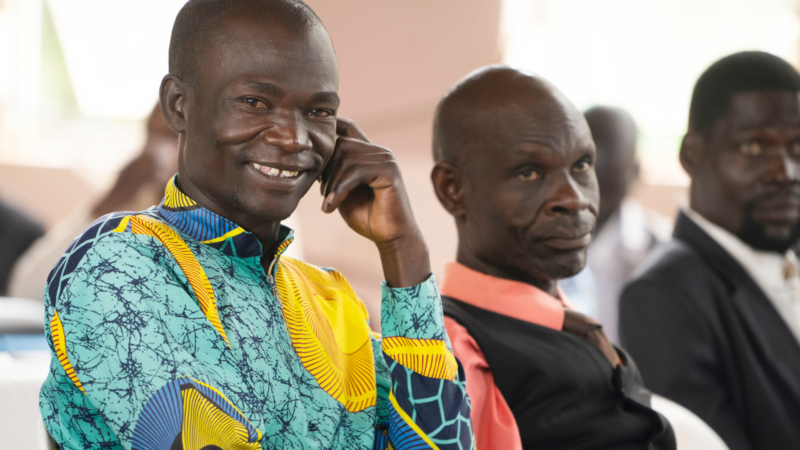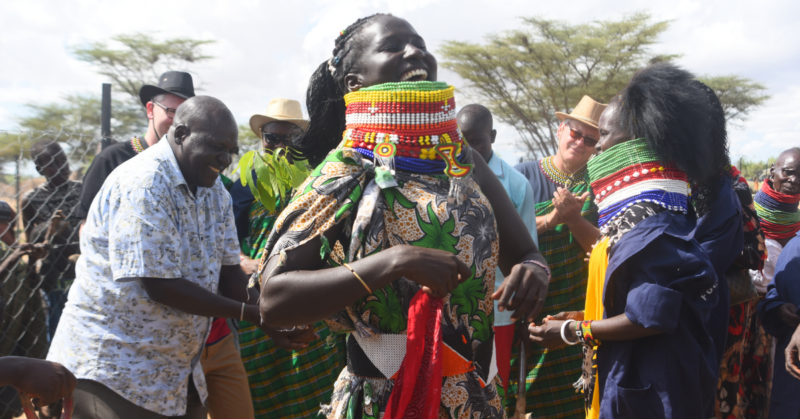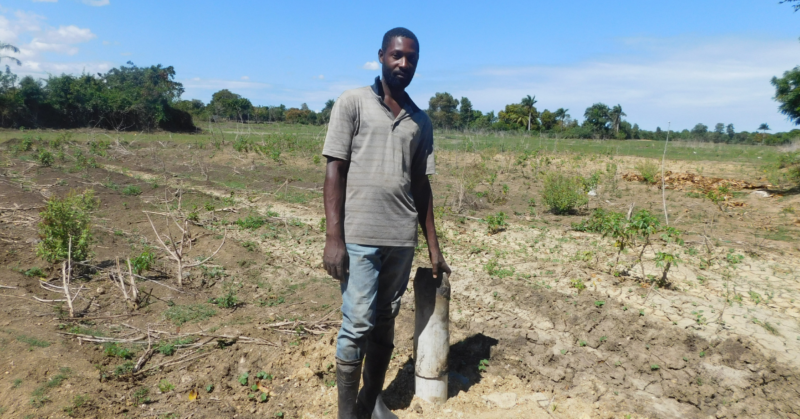By Katie Knight; reprinted with permission from Nations Media.
While Moses and the Israelites built bricks out of dirt, constructed Pharaoh’s treasure cities, and were beaten by Egyptian guards, they cried out to God in their misery. And God heard them.
But, even more telling of his character, God reacted.
God didn’t tell the Israelites to pray harder. He didn’t tell Moses to build a soup kitchen for the Israelites so they could have a hot meal after a long day of abuse. Instead God liberated his people from their enslavement—and he included them in the process.
“God tells Moses to go to Israel’s leaders [before speaking to Pharaoh], not to just restore them spiritually and to know that God sees them and cares for them, but [to show that] they’re part of the solution,” says Jason Fileta, Vice President of Christian development organization Tearfund USA. “They go with Moses to Pharaoh. They travel with him to make this claim of how they deserve freedom and dignity. That story is incredible to me.”
That very idea—of partnering with impoverished and fractured communities around the globe in order to bring about spiritual, material, and physical restoration for both involved parties—is the foundation of today’s movement of holistic, transformational development.
“Transformational development is the holistic response to the problems facing the most marginalized in our world,” Fileta says. “Transformational development, therefore, is a Christian’s response to injustice that seeks to restore the relationships people have with each other, with themselves, with God, and with creation.”
Transformational Development Defined
Dr. Greg Burch, the founder and director of Multnomah University’s Global Development and Justice program, describes transformational development as a trialogue between three overarching concepts: mission, community development, and justice.
“Transformational development is the non-poor and the poor coming together in recognition of a need for transformation in our lives and in the lives of those who are marginalized,” says Burch. “The movement is towards recognizing that God desires to use both the poor and the non-poor as transformative agents in this world, to bring hope to the communities in which God places them.”
Burch spent seven years ministering to children living on the streets in Caracas, Venezuela, where he says he first learned the importance of relational mutuality in development; without deep, meaningful relationships, development work is rendered nearly useless.
“We thought that if [Venezuelan street youth] said the sinner’s prayer they would get off shoe glue, move into the community center we had set up, they would read their Bibles every day, and they would no longer be addicted to the crack cocaine they were smoking,” Burch says. “And while coming to faith in Christ is key to this entire process, there was so much more we needed to realize in terms of the holistic nature of the Gospel. There was nothing magical about saying a prayer; it was a relationship with people that were willing to walk with them through the challenges they were facing.”
In addition to building relationships to foster a genuine relationship of trust, the process of community transformation is also expedited when development organizations involve local community members who are already known and trusted by their neighbors.
“Trust is a critical component of a successful development program,” Fileta says. “When the program is being led by the local pastor who you already have a deep relationship with, who you already seek for spiritual counsel, who you’ve seen in the media speaking out about the issues in his community, that trust is already there. That’s one of the reasons it’s more efficient; it creates more sustainability [because] that leader already has trust of the people of the community.”
While American churches have sent congregants on short-term missions both locally and overseas for decades, Burch points out that there are key distinctions between what most people think of as missions trips and true development work. While the majority of missions trips last a week or two—even one- to two-month-long trips are considered short-term—development, by definition, is a long-term commitment. Because of this lack of time to build deep relationships and ability to see projects into fruition, short-term trips are less effective than holistic development work.
Just as important as time commitment, Burch says, is the recognition that we, the missionaries or development workers, are every bit as broken as the people we minister to. The fact that God has chosen to use certain people in his mission of restoration does not negate the fact that those people have an equal need for healing—it just manifests in different ways.
Moreover, structures and systems must be sustained by justice, Burch says. Just structures lead to less violence, less corruption, less power and domination abused by the privileged.
“I don’t think we can achieve sustainable development without justice being deeply connected to it,” Burch says. “Justice ensures we have systems and structures that are working for everyone, and once we have that in place, what we do to bring about the change will be lasting. It’s sustainable because the systems are working for everyone.”
Walking in Partnership
The relational structure of holistic development manifests in true partnership: while the development agency may come into a situation with specialized knowledge about community building, they start and finish their work in partnership with the community itself. The community pinpoints the issues it wants to work on, the strengths and gifts already present there, the best course of action toward progress, and how to make that progress sustainable.
More often than not, with faith-based development organizations, the primary contact is the local church. Part of the reasoning behind this is theological, Fileta says, in believing that God’s mission for the church is to be the active and primary change agent in a community. From a practical standpoint, it’s far more efficient both in terms of money and time to equip leaders who already know the local language and have a thorough understanding of community dynamics.
Dr. David Bronkema, dean of Palmer Theological Seminary and Associate Professor of International Development at Eastern University, spent years working with development organizations in South American countries like Ecuador, Peru, and Colombia. It was during his time overseas that he realized building relationships with locals was both humanizing and personally humbling.
“When you’re working with people who are very poor, when you get to know people, it’s not that their suffering disappears but because of your friendship, but you get to know them as people and they’re survivors,” Bronkema says. “It’s not like they’re sitting there saying ‘woe is me.’ These people are literally in dirt poor places—people are suffering, they don’t have access to medical care—but there’s a lot of joy in the midst of that. The relationship part is that the joy is infectious.”
Scriptural Backing for Transformational Development
From the Exodus story of freeing the Israelites from the grips of Egypt, to the Year of Jubilee described in Leviticus, to the prophets Isaiah, Micah, and Amos, and finally to Jesus’ ministry, Bronkema and Fileta say that Christian development organizations have reasons to believe that only evangelism or only satisfying material needs alone are not what God intended.
John 10:10 says that Christ came that we might have life, and have life abundantly. This abundant life, Burch says, is something we should strive for even on this side of heaven, and that it can manifest in the way development organizations operate. Jesus not only cared for people’s spiritual needs, but also their physical needs. Because Jesus ministered holistically, so should his followers.
“If we truly understand ourselves in a holistic, biblical worldview, we’re made up of body, soul, and mind,” Burch says. “We are much more than just spiritual beings. Christ desires for us to flourish. The life that Christ lived is a perfect example throughout the gospels of what it means to thrive, despite the pain he suffered.”
When considering Biblical support for holistic mission, Bronkema thinks of Galatians 2. Paul returned to Jerusalem after 14 years of evangelizing abroad, and speaks with James, Peter, and John to get their approval to continue to preach. They, of course, gave him permission to keep seeking out Gentiles, but they left him with one message: “All they asked was that we should continue to remember the poor, the very thing I had been eager to do all along” (Galatians 2:10). To Bronkema, the fact that Paul, the great evangelist, prioritized caring for the poor on the same level as preaching the Gospel, is evidence enough that missionaries today ought to do the same.
“How can you separate the two?” Bronkema says. “You can’t.”
Continue reading the rest of this blog on the Nations Media website here.




